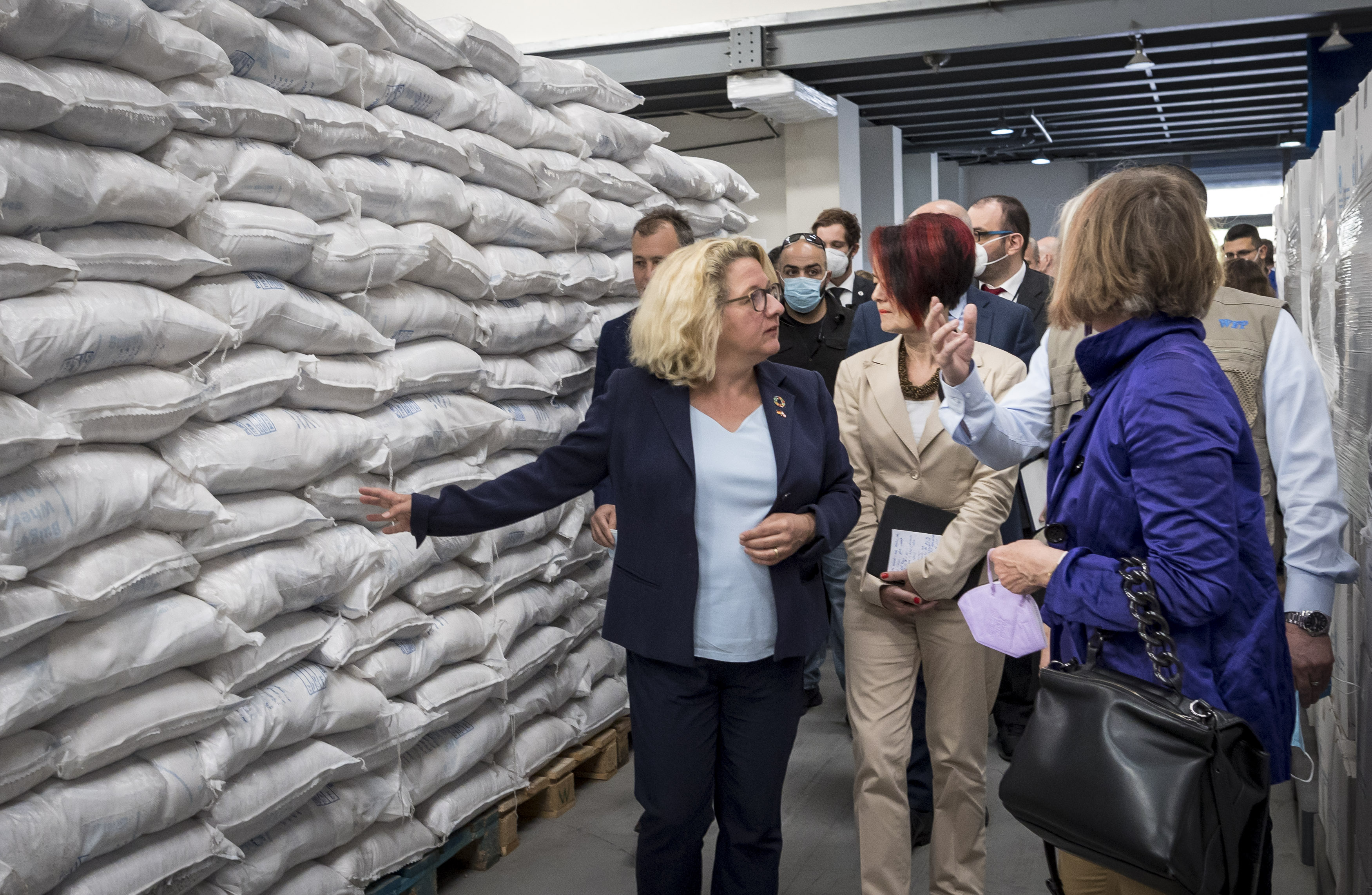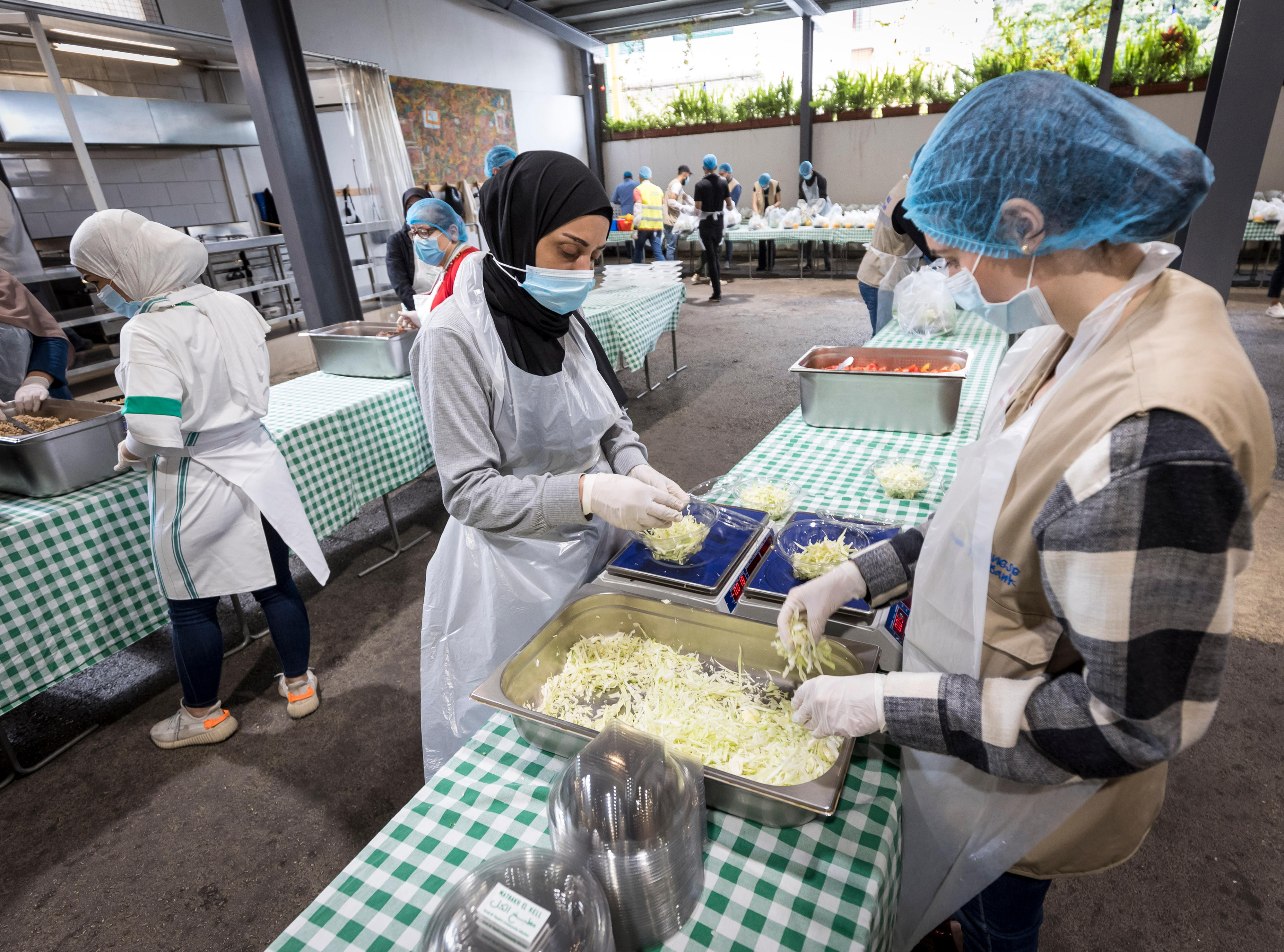Lebanon Minister Schulze visits Beirut, says work of World Food Programme is more important than ever
Press release 25 April 2022 | BEIRUT – During a visit to Beirut, Lebanon, German Development Minister Svenja Schulze today was briefed about the work of the United Nations World Food Programme (WFP). She announced that the Development Ministry would provide 10 million euros for WFP to continue its work in Lebanon. Lebanon is one of the countries that depend most on grain imports from Russia and Ukraine and that are facing an increased food crisis because of the war. In view of the imminent hunger crisis, Schulze also promised that she would lobby for a significant increase of the amount German budget funding currently envisaged for WFP. She has also been inviting players internationally to form an alliance for global food security to coordinate global support in a swift and far-sighted manner.
German Development Minister Svenja Schulze visits the UN World Food Programme (WFP) food warehouse in Beirut, Lebanon.
Development Minister Schulze said, “We are faced with what may become the most severe food crisis in decades. The World Food Programme is our most important partner in working for food and nutrition security. I have tremendous respect for all the WFP workers who are working tirelessly to save people from hunger and from dying of starvation. So far, Germany has been the second largest donor to WFP. We will continue our support. In view of the imminent hunger crisis, we will have to do more than what we had budgeted for so far – and we will do more. In Lebanon, we are jointly working to provide food aid and simultaneously create new sources of income. What matters ultimately is to reduce dependence and make societies more resilient to crisis. The alternative is hunger and destabilisation.”
Together with WFP representatives, the Minister visited a WFP training project, and a bakery and a market that work together with WFP. She also met with families from Lebanon and with refugees from Syria.
Last year, one third of all people in Lebanon depended on WFP assistance. The war in Ukraine is significantly exacerbating the food situation, which had already been tight. Like a number of other countries, Lebanon is almost entirely dependent on grain imports from Russia and Ukraine. The challenge is compounded by the steep rise in food prices.
In the community kitchen of the project “Matbakh el Kell” (“A Kitchen for All”), meals are prepared for people who were particularly affected by the 2020 explosion in the Beirut port.
The provision of the additional 10 million euros for WFP is still subject to approval by the German parliament, where the budget process is still under way. Two thirds of this funding is to go towards resilience. This includes food aid that is tied to the development of sustainable resources and infrastructure (food assistance for assets) and food aid that is provided in combination with training (food assistance for training). Participants receive food, vouchers or cash if they build sustainable infrastructure that benefits the community or if they take part in training courses. The remaining third of the funding is to go towards Lebanon's first targeted social protection programme (entitled National Poverty Targeting Programme). This year, the Programme will help 75,000 needy households to meet their daily needs, for example through food vouchers.
At the end of April, the German Cabinet will adopt a budgetary amendment in response to the Ukraine crisis. Minister Schulze has called for the amendment to include, among other things, extra funding to fight hunger in the regions affected by the global food crisis.
Ute Klamert, Assistant Executive Director at the UN World Food Programme, said: “The impact of the war in Ukraine can be felt everywhere in the world. Countries like Lebanon that are facing multiple challenges are hit particularly hard. In times of numerous crises and constantly rising needs, it is more important than ever to create a basis for resilience. Our goal must be for everyone to be able to meet their own need for food. Germany's tireless support for our work is leading to positive impacts in the lives of people all across Lebanon. Not least thanks to Germany's contributions, we have been able to reach more than 2.1 million people in 2021 alone. During our current visit, we have gained a first-hand impression of the severe effects of local and global crises in Lebanon. So the additional funding comes at the right time. Germany is one of WFP's largest donors in Lebanon. We are grateful for the continuous and reliable support that is enabling us to give so many people in Lebanon a better future.”
Germany is WFP's second largest donor after the United States. During the COVID-19 crisis year of 2021, German disbursements to WFP totalled 1.2 billion euros, of which 476 million euros came from the budget of the BMZ. In addition, the BMZ has provided 135 million euros for the period of 2018 to 2024 in support of WFP's country programme in Lebanon.

